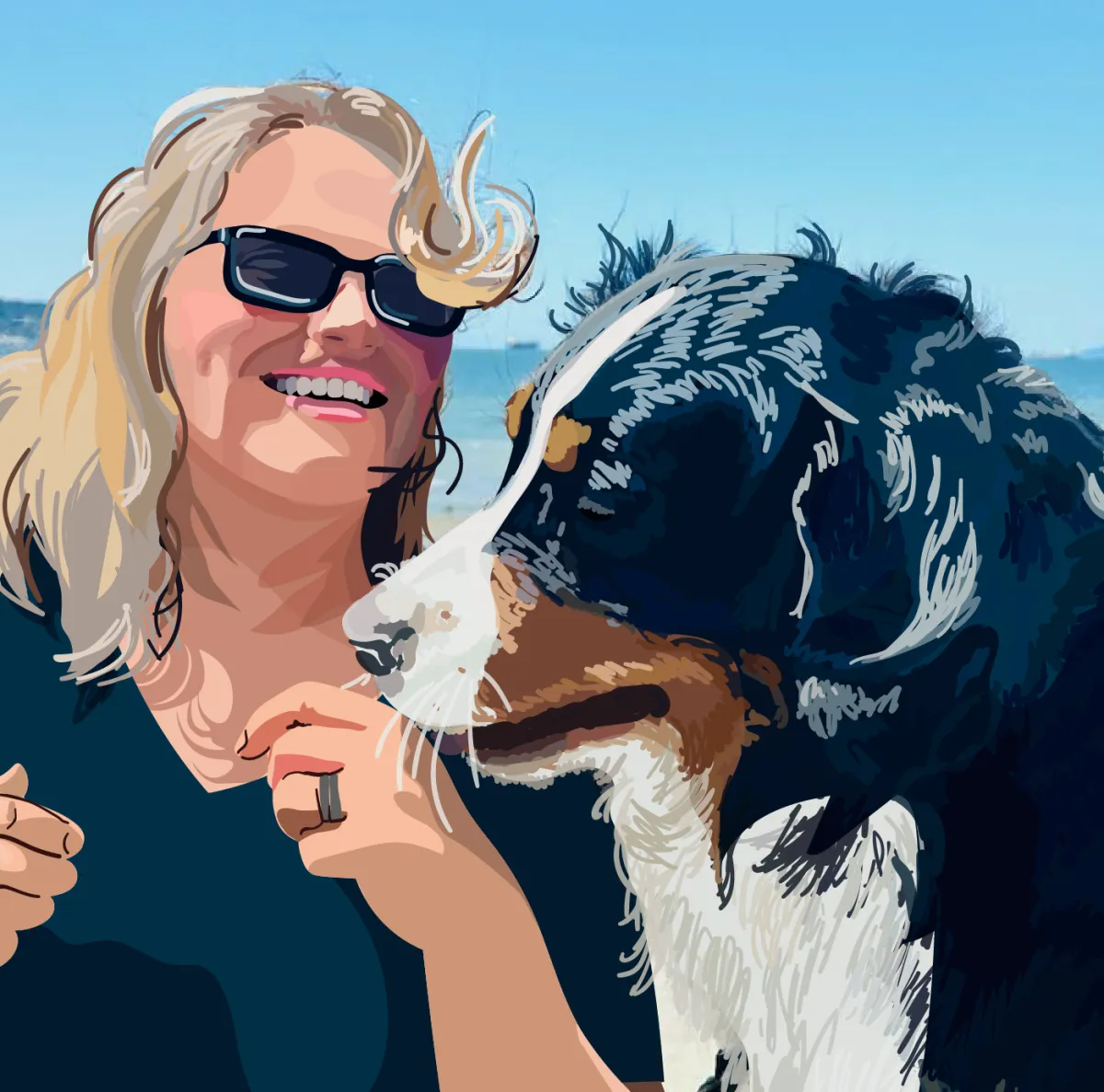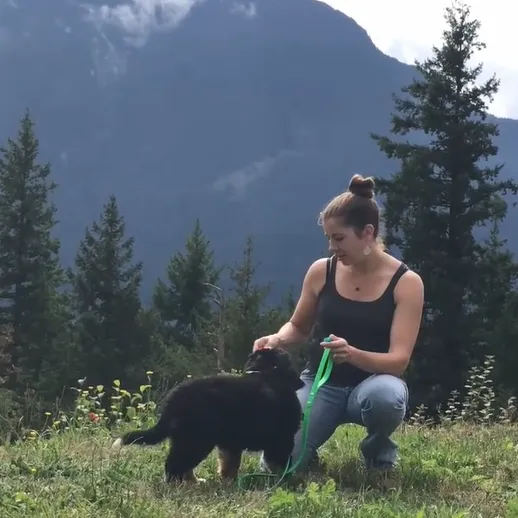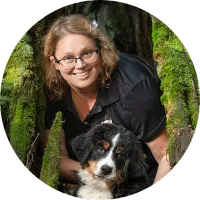

About Us
Since 2011, we’ve combined formal education in psychology, veterinary care, and canine cognition to provide exceptional dog training.
Dedicated to the humane and ethical treatment of our best friends, we rely on the latest research, while ensuring that our work is rooted in 15,000 years of human-dog connection.
Dogs and humans have evolved together for 20,000 years. They have found food for us, and protected our families and livestock. They have gone to war with us and acted as gentle playmates for our children. They have laid down their lives to save us.
Our lifestyles have changed a lot in the last century, but our need for dogs hasn't. A dog and their owner, when reunited, sync their heart rates within minutes. Just owning a dog decreases heart attack mortality by 30%.
We are designed to live with dogs, but we need to learn how to incorporate them into our chaotic modern lives.
We're here to help you and your dog learn how to live together in these modern times.
Forget sit and stay!
At Wag The Dog we can teach dogs to:
Find our phones and keys when we lose them.
Find our children when we lose them!
Put recycling in the blue bin.
Fetch their own leash for walks.
Close doors and cupboards.
Imitate our actions.
Communicate their needs and thoughts clearly.
Recognize fragile people like children and the elderly and be cautious around them.
Accompany us on outings and errands.
Trust us to return home to them when we go out.
Understand simple phrases and two step instructions.

Carol Millman (she/her)
- Lower Mainland
B.Sc, Psychology, Veterinary Technologist, Certified Pet Dog Trainer - Knowledge Assessed (2022), Certified Trick Dog Instructor
Carol lives in Port Coquitlam and works in the Lower Mainland. Her autism gives her a unique perspective which she brings to her work with both dogs and people. Her time working as a veterinary nurse culminated in becoming the Director of Medical Services at a holistic veterinary clinic.
In 2008, Carol was hired as an apprentice Advanced Instructor at Pacific Assistance Dogs Society (PADS). She trained and placed wheelchair assistance dogs, hearing dogs for the Deaf, and facility therapy dogs. She also ran puppy classes and assisted in the daily care of the dogs in training.
Carol is now the Director of Training at Heeling Assistants Canada, and still helps pet dogs through Wag The Dog.

- Currently On Leave -
Amelia Kellum (she/her) - Fraser Valley
B.Sc Canine Studies, Certified Professional Dog Trainer Knowledge/Skills Assessed (2022), Certified Trick Dog Instructor.
Amelia is a certified professional dog trainer with nearly two decades of experience training dogs - including hunting, acting, and assistance dogs such as hearing, therapy, guide, and mobility dogs.
Amelia has learned directly from Bonnie Bergin, pioneer of the disability assistance dog, and is also a graduate of the Ben Kersen and the Wonderdogs professional trainer's program.
She apprenticed at PADS as an instructor and has been training independently since 2010. She now lives in Hope with her family.
What can you achieve
with our help?
Come check out our blog!

Public Access For Service Dogs In Training

So, You Want To Train Your Dog In Public
Every time we put a cape on a dog which says "service dog" or "service dog in training" we take on a personal mantle of responsibility.
Your dog may be the only service dog the public sees today, or this week, or even this month. That means that their experience with your dog will stand out in their mind, and will become part of their personal experience of service dogs.
Their experience with you will affect how they perceive and behave toward other disabled people and their service dogs including people like the Deaf, people with Cerebral Palsy, non-speaking autism, or selective mutism or other conditions which affect their ability to communicate their rights and needs easily to members of the public.
So it is crucial that you understand and can articulate service dog laws in your area, and that your dog creates a positive impression in peoples' minds.
That's a lot of responsibility to lay on a disabled person and their teenage puppy isn't it? Thankfully there are things we can do to help ensure that the public has a good experience with our dogs.
Set Your Dog Up For Success
1. Do not take a bouncy dog who is full of beans to a place where they need to be calm and relaxed. Make sure your dog has had their 20-30 minutes of cardio, and has had some being-a-dog time. Make sure all of your dog's needs are met before you ask them to do hard work.
2. Make sure your dog understands what is expected of them. Before your dog goes into dog-exclusive zones, you should first have lots of practice in pet-friendly locations such as pet stores, Winners, and Canadian Tire.
3. Be prepared to reward heavily. Hard work needs acknowledgement of that hard work so be ready to give your dog full attention, praise every little success, and shower high value treats on your dog at regular intervals.
4. Work for your dog's attention. The more eye contact the dog gives you, the less trouble they will cause. Always be talking, encouraging, and coaching your dog. Do not appear distracted or overwhelmed. Save your real shopping trip for later if necessary.
Know Your Rights: Remember You Have None.
It's really important to understand this. While a disabled person with a well behaved and functioning-but-as-yet-uncertified service dog does have certain legal rights, if that dog is still pulling on leash, rushing up to people, and having accidents in stores, they do not.
This dog is still causing potential hardship to the public and the business, which means they have the right to ask you to leave.
Think of a service dog like its a wheelchair.
If you really need that wheelchair, and it's functioning properly, then you have the right to bring your wheelchair into the store without being hassled about it. But if your wheelchair's smart drive started malfunctioning and driving you into people's shins and knocking down merchandise, the store absolutely has a right to put your possessed conveyance outside and out of harm's way.
"How Do I Train My Service Dog If I Don't Have Public Access Rights?"
That's the big question, isn't it? We all know that dogs are situational learners, and that no amount of down-stays at dinner time can teach your dog to snooze under the table at The Keg.
So you need to take them into public anyway, and rely on the good will of stores and restaurants to tolerate your dog's less-than-polished ways.
Ultimately the business has the right to admit entrance to dogs if they feel like it, except in governmentally controlled areas such as restaurant kitchens (no, dining rooms don't count and I've spoken to city bylaw offices to confirm this).
Most businesses in the Lower Mainland of BC are accustomed to service dogs in training thanks to decades of exposure to PADS and BC Guide Dog puppies-in-training. So you can coast off of their hard work by requesting and usually receiving entrance to most places. Be sure you don't take this for granted and that you don't undo their hardwork by behaving in an entitled or offensive manner. Show gratitude and grace, and reassure management that you will leave if you are asked to do so.
Sample Script: Entering a Restaurant
Host: Welcome to The Fancy Family Eatery, table for two?
Handler: Yes please, and we have a service-dog-in-training with us. He's coming along nicely but if he causes any problems you can ask us to leave, okay?
Host: Okay, is it all right if I seat you in that corner?
Handler: That would be perfect, thank you, and if you can spare a booth, it'll give me more room to keep this guy out from under foot.
Host: I'm sorry, all of our booths are needed for larger groups.
Handler: Okay, no worries, I'll keep him under my chair and sit close to the wall. Let me know if there are any problems, ok?
Host: Sure thing. What a cutie. What's his name?
Handler: Samson. He'd love to say hello but he's learning not to put fur all over nice waitress's black dresses.
Host: Aw, that's so sweet. This way please.
Sample Script For Entering A Mall
Guard: Excuse me, is that a service dog?
Handler: We're just training today. She's preparing for her certification test.
Guard: I'm sorry, we only permit fully certified dogs in this mall.
Handler: Actually uncertified dogs do have legal rights as long as they aren't causing undo hardship to the business. Here's an informational document from Human Rights BC. But if we cause you any problems, we'll be sure to leave. After all, how can I certify him if I don't train him?
Guard: It's just that the bylaw officers are strict about dogs in the food court, and people usually have ID.
Handler: Well, according to the bylaw office they're only concerned if the dogs come into the kitchen. You can give them a call to confirm if you like and I'll wait. But if it makes your job easier, I can avoid the food court today. And again, if you get any complaints about my dog you can let me know and I'll leave. I'm not here to cause trouble, I'm just preparing my dog for her certification test.
Guard: Well... Okay. Let me just tell my boss.
Handler: Sure thing.
Guard: Okay, you can go.
Before You Go Inside: A Checklist
The dog has been exercised, given water, and given sufficient pottying time.
Note: It's a good idea to revisit the potty spot 10-15 minutes after arrival, as sometimes the excitement increases metabolism and they may have to go again.
Your dog is clean, well groomed, and is wearing something to signify that they are in training.
You have high value food treats
You have water for your dog
You have a clean up kit in case your dog has an accident - paper towel, wet wipes, poop bags.
You have documentation to help you navigate public access difficulties including a couple print-outs of this document from Human Rights BC. If you have a letter from your doctor or an acceptance letter from the certification office in Victoria, bring that too.



We work on land which was taken from the nations who had lived here for thousands of years. They are still here and they are still waiting patiently for us to stop being jerks about it.
© 2024 Copyright Wag The Dog Training
All Rights Reserved




